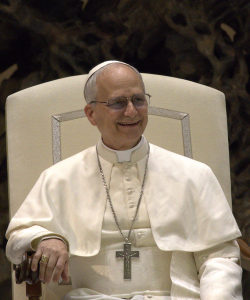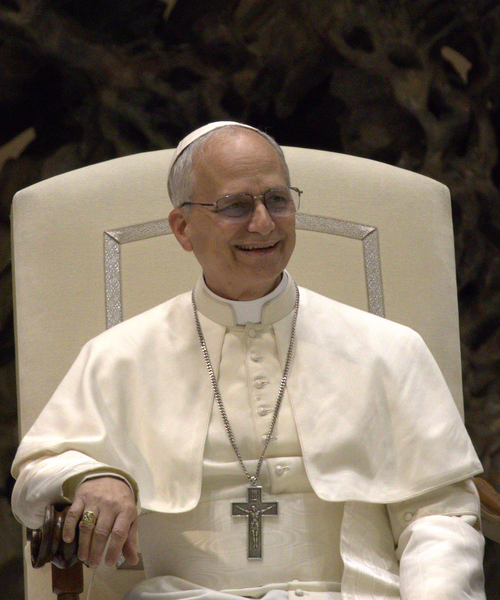 Edgar Beltrán, The Pillar: Pope Leo XIV, Who Speaks On The Need For Christians To Show Love And Support To Those In Need, Defending Their Dignity/ Wikimedia Commons
Edgar Beltrán, The Pillar: Pope Leo XIV, Who Speaks On The Need For Christians To Show Love And Support To Those In Need, Defending Their Dignity/ Wikimedia Commons
I fear that Catholic schools are not doing a good job promoting Catholic teaching on the dignity of the human person. They need to do better at explaining both why racism (and sexism) is a sin. They also should be teaching about the preferential option for the poor and needy. I remember the controversy surrounding Covington Catholic and the way its teens not only appeared to insult Native Americans, but the history which they were shown to have with racism in general. Some thought they represented a lone aberration. But I do not think this was true, and that is because I saw many Catholics defending them and their actions. Now, we have another terrible example coming from St. Joseph Catholic School in Hanover, Pennsylvania, where, in a Halloween parade, a float was made showing the entrance to Auschwitz, complete with the sign “Arbeit Macht Frei,” work makes you free. The bishop, upon hearing about it, apologized. That might be a start, but the bishop needs to do more than that; the bishop needs to find out why children (and their parents) thought it was appropriate for the parade as well as why it was allowed once it showed up for the parade itself. We should not take lightly that those behind the float did not think it would be a problem; either they were naive and poorly educated themselves, or they are trying to appear naive (and so, give us a kind of dog whistle).
With the rise of antisemitism, with the rise of racism, with the rise of Christian nationalism, with the rise of a government which is suggesting its own form of “work makes you free” as a way to justify denying those who have no work the food and medical care they need (whether or not they can get work, which is not always easy for those without it), Catholics ought to be doing better. Children should be taught why the Holocaust was evil so that they would not be tempted to identify with those ideologies which led to its execution. They need to shown how those ideologies, especially as they seem to be reappearing in the modern world, not only go against Catholic teaching, but basic human decency. This does not seem to be happening. Sadly. every time such racism emerges in a Catholic school, the children (and those who taught them) get an easy pass once they are no longer in the limelight, and the evils of Christian nationalism and racism continue to rise up and fester in the Catholic environment (schools, parishes, Catholic media, etc.).
Basic Catholic teaching of the human person, that is, the dignity of the human person, is being ignored, if not outright rejected, by many Catholics. Is it a fault of the education process? Likely, that is probably a part of the problem. But it is also the fault of Catholic media and many of the outspoken (and so influential) bishops who, upon hearing such actions, say nothing against them, treating such things as unworthy of their attention or concern. With many vocal Catholic influencers having embraced racism, sexism, anti-immigrant hatred, and Christian nationalism without any significant push-back from officials in the church, it is not difficult to see how and why such evil is growing in Catholic circles.
I, like so many others, have noted how limited an understanding many (if not most) Catholics have about Catholic social doctrine, and as a result, they are easily led to accept and promote political ideologies which teach the exact opposite of what Christ taught. Fundamental to Catholic social teaching is the dignity of the human person. “The absolute dignity of the human person is the foundational principle of all Catholic social teaching, repeated over and over again, such that, if this were not first affirmed, everything else ventured would crumble like a house of cards.”[1] When that dignity is denied by racism, by sexism, by hatred of the other, when Catholics mistreat and abuse those whom they should help, it is obvious that our Catholic leaders are not doing their job; they tend to be hyper-focused on their own particular pet projects or interests, or worse, joining in with such abuse, letting, once again, evil to fester. When we see the symptoms of this problem, such as the float coming from St. Joseph’s, we should not sweep it under the rug with a simple apology, thinking that fixes everything. It doesn’t. We need to know why it was thought appropriate and counter it with basic Catholic teaching. We also need to do more than that. We need to act. Catholics needs to be drawn together to work on and help actualize what they have been taught, especially when the dignity of the human person is being denied out by the American government and its leaders (as can be seen in the way migrants and the poor are being abused in the United States). Pope Leo XIV, to be sure, knows this, which is why he is speaking up, not only telling American Catholics they must deal with the evil being experienced in America today, he points out the need for Christians, for the church, to continue to protect those whom society undermines, the poor, instead of shrugging their shoulders when they come face to face with governments which undermine their dignity:
The condition of the poor is a cry that, throughout human history, constantly challenges our lives, societies, political and economic systems, and, not least, the Church. On the wounded faces of the poor, we see the suffering of the innocent and, therefore, the suffering of Christ himself. At the same time, we should perhaps speak more correctly of the many faces of the poor and of poverty, since it is a multifaceted phenomenon. In fact, there are many forms of poverty: the poverty of those who lack material means of subsistence, the poverty of those who are socially marginalized and lack the means to give voice to their dignity and abilities, moral and spiritual poverty, cultural poverty, the poverty of those who find themselves in a condition of personal or social weakness or fragility, the poverty of those who have no rights, no space, no freedom.[2]
From the Christian (Catholic) standpoint, the dignity of the human person is something which not only must be taught, it is something which requires action – faith without works is dead. When human dignity is undermined by the powers that be, Christians need to stand up and resist. While there are sound secular reasons for this, Christians have a theological reason for it as well: the fact that humanity, and therefore the human person, is made in the image and likeness of God. This is a revealed truth of the Christian faith, one which must stand at the heart of any Christian theological anthropology. When it is denied, in thought or in deed, no matter how much someone thinks their vision of the human person flows from Scripture and revelation, their theological exploration is not properly grounded and holds little, to no, substance to it.
I find it is quite sad how shallow many Catholic conversations are concerning theological anthropology, because, in the end, they demonstrate not only a misunderstanding of theological anthropology and its development, they fail to deal with the central and primary foundation of theological anthropology which is the creation of humanity in God’s image and the dignity which it gives to every human person. They ignore the implications of this truth – that is, they fail to deal with Catholic social teaching, especially in regards to those whose humanity is being actively undermined. As a result, various forms of racism, sexism, and hate speech, are an ongoing problem within the Catholic community. It is an embarrassment to me as a Catholic to see it, but I also know where it is coming from, and see it will not end until Catholics get serious and deal with the mess they have let develop.
[1] Terry A. Veling, Practical Theology (Maryknoll, NY: Orbis Books. 2005), 111.
[2] Pope Leo XIV, Dilexi te. Vatican translation. ¶9.
* This Is Another Post From My Personal (Informal) Reflections And Speculations Series
Stay in touch! Like A Little Bit of Nothing on Facebook.
If you liked what you read, please consider sharing it with your friends and family!
N.B.: While I read comments to moderate them, I rarely respond to them. If I don’t respond to your comment directly, don’t assume I am unthankful for it. I appreciate it. But I want readers to feel free to ask questions, and hopefully, dialogue with each other. I have shared what I wanted to say, though some responses will get a brief reply by me, or, if I find it interesting and something I can engage fully, as the foundation for another post. I have had many posts inspired or improved upon thanks to my readers.
